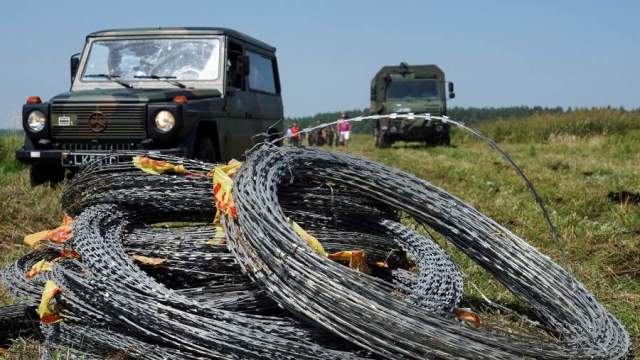The Lithuanian army is ready to set up checkpoints with armored vehicles at the camps of illegal migrants who arrived in the republic from the territory of Belarus. This was announced on Tuesday, July 27, by the head of the country's Defense Ministry Arvydas Anushauskas.
"The army is ready to increase its assistance to border guards, allocate additional logistical resources, and if necessary, together with border guards, we can block the territory of migrant camps with Hammer armored vehicles, so that local residents feel calm," he wrote on his Facebook page .
In turn, Lithuanian Interior Minister Agne Bilotaite said during a press conference that the agency proposed to the government to introduce a state of emergency in the areas bordering Belarus in connection with the influx of illegal migrants, the portal writes Delfi.lt. She pointed out the need to comprehensively assess the situation.
"We need to evaluate a number of components. We are doing this on the part of the Ministry of Internal Affairs, so that our employees can more effectively perform tasks on border protection," Bilotaite stressed.
The day before, it was reported that the first 50 km of barbed wire, allocated from the reserves of the Estonian Defense Forces, were sent to Lithuania to help strengthen the Lithuanian border. A total of 100 km of barbed wire will be transferred.
Estonia also announced its readiness to send three drone maintenance teams to Lithuania from August 1 to get a better overview of what is happening at the border.
On July 19, Lithuanian Foreign Minister Gabrielius Landsbergis called on citizens of the Middle East and Asia to look for legal ways to arrive in Europe, and not to use the services of dubious intermediaries.
On July 12, the EU High Representative for Foreign Affairs and Security Policy, Josep Borrel, said that the EU Council is ready to consider the introduction of new sanctions against Minsk in response to the increase in the flow of migrants through Belarus to Lithuania.
Before that, Lithuania called on the European Union to impose new sanctions against Belarus and accused Minsk of organizing the illegal transfer of migrants from Asia to the country. Then Vilnius reported that the number of illegal migrants arriving in Lithuania from Belarus increased 22 times.
It also became known that the EU Agency for External Border Control Frontex will send helicopters to Lithuania to monitor the border with Belarus from the air. In addition, it was reported that additional armed patrols, interpreters, as well as personnel working with migrants were sent to the republic.
In early July, the Lithuanian authorities declared an extreme situation at the state level due to the influx of illegal migrants from the territory of Belarus.

